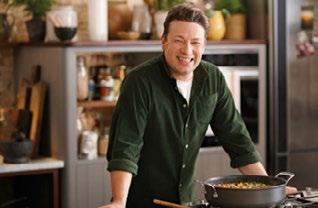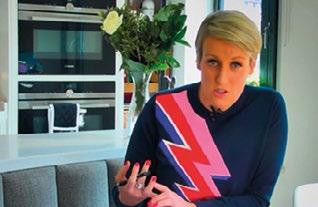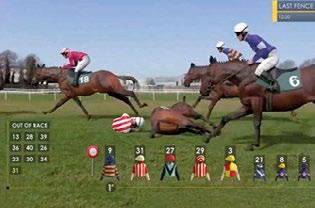
6 minute read
Protect and survive
Protect and survive Coronavirus is transforming the TV industry and pushing broadcasters to find ingenious ways to keep the nation entertained and informed, says Steve Clarke
March 2020 was a month like no other in television. Con cern that staff might become infected by Covid-19 brought rapid changes as broadcasters cancelled filming on some of their biggest shows. For what is believed to be the first time in more than half a century, even the set of Coronation Street went dark. Other high-profile suspensions in the production freeze were Emmerdale, EastEnders, Peaky Blinders, Line of Duty and Holby City. Schedules were upended to accommodate new programmes weeks. News bulletins were extended as grateful millions tuned in to trusted public service broadcasters.
Advertisement
This year’s TV calendar will have to do without such landmark occasions as Euro 2020, Eurovision, Glastonbury and the Olympics. Across the board, networks have responded with speed and ingenuity to keep the UK informed and entertained. Jamie Oliver’s new show is filmed by the celebrity chef in his own home using an iPhone – and aided by his family.
Alex Mahon, CEO of Channel 4, says: “The Covid-19 outbreak presents huge challenges for broadcasters and the Responding to the national lockdown, daytime TV is being beefed up. On Channel 4, Grayson Perry will teach a nationwide art course, while Kirstie Allsopp is fronting her own craft show. Elsewhere in the schedules, the pandemic is generating a creative response. ITV staged a Virtual Grand National using CGI and sophisticated algorithms. For devotees of arts TV, Simon Schama is to present a virtual museum tour, part of the BBC’s Cul ture in Quarantine initiative. Graham Norton’s BBC One chat show returns on 10 April, but hosted from his home and with virtual guests; Channel 4’s
Feel-good entertainment: Outnumbered

commissioned for the pandemic, such as Channel 4’s Jamie: Keep Cooking and Carry On, a cookery show for an era when basics such as eggs are not always readily available. On BBC One, Question Time – with each panellist socially distanced – was promoted to primetime, albeit minus an audience and screened from the same location every week.
Presenters such as Good Morning Britain’s Susanna Reid and BBC jour nalist George Alagiah (who tested positive for Covid-19) self-isolated. In common with many other presenters, Reid broadcast from home for two creative industries, and we’re doing all we can to support our partners at independent production companies to help them through this.
“Together, we are at our best when we use our creativity and ingenuity to respond to challenging circumstances, and I’m incredibly grateful to them for the way that they are working with us to respond to this and help entertain and inform our audiences through these strange and unprecedented times.”
Thinking outside the box is second nature to commissioners and produc ers, and new ways of working have already become commonplace. new daily series The Steph Show was brought forward and is broadcast live from Steph McGovern’s home.
Also, expect more feel-good fare in primetime following the BBC’s deci sion to run classic comedy such as Gavin & Stacey and Outnumbered in BBC One peak time on Saturday evenings. With most of us marooned indoors, TV audiences have increased hugely – and not only for news programmes. “The figures are amazing,” says one executive. “Young people are watching linear-TV in big numbers.”
On 21 March, ITV’s entertainment blockbuster Saturday Night Takeaway
achieved its highest audience ever, as an average of 9.5 million people tuned in. Two days later, a live address by Prime Minister Boris Johnson announcing new restrictions on movement was seen by around 27 million as it was screened by BBC One, BBC News, ITV, Channel 4, Channel 5 and Sky News.
Once the consolidated audience is in, Johnson’s speech could equal the 32.3 million viewers who watched Eng land’s World Cup victory in 1966, British TV’s biggest audience of all time.
Those still going into TV production centres face many novel challenges due to social distancing rules. But it is no easier for those working from home. “In theory, it should be a lot easier but everything takes so much longer. Meetings have to be set up in advance. The pressure is incessant,” says one news producer.
“Dealing with covering the virus, changing rosters, and meeting health and safety requirements is completely overwhelming,” says another. “Every day is getting more challenging.”
Financial hardship looms for workers, and production companies face a struggle to survive.
ITV announced on 23 March that it was reducing its programme budget by £100m. “We are operating in unprece dented and uncertain times, requiring us to take difficult decisions, plan carefully and act with speed,” Carolyn McCall, ITV CEO, said. “Our absolute priority is to protect our people, while trying to ensure that we deliver the news and programmes our viewers value and love to watch, and to keep them informed.” logistics. Once we get the green light, it won’t suddenly all kick off again.” The knock-on effect of the produc tion freeze is that, come the autumn, a shortage of new shows, especially high-end drama, will add to the pres sure to find clever solutions. The Covid-19 crisis could galvanise demand for unscripted content and help to generate a new wave of factual entertainment shows that can put a smile on viewers’ faces.
“I think there’s going to be a ton of opportunity for non-scripted,” David George, CEO of ITV America, recently told Deadline. “If you go back to the last economic downturn, you saw unscripted pop out of that. And even going back to the [US] writers’ strike, there was a non-scripted boom out of that.” Documentary-makers are also think ing laterally. ITV’s Coronavirus, Isolation & Me [the working title], produced by Shine, is being filmed using selfshooting mobile technology and does not require a camera crew. The footage is downloaded to the film’s editors.
Broadcasting from home: The Steph Show

Channel 4 Innovative sport: The Virtual Grand National

ITV
Channel 5 and ITN suspended the former’s 6:30pm news from 6 April in order to concentrate on the 5:00pm flagship bulletin. Similarly, the BBC has halted its morning regional news out put to concentrate on its core bulletin. On the plus side, the BBC revealed that planned job cuts of 450 journalists, announced in January to help save £80m, would now be put on hold. Away from the production floor, senior executives have been forced to make some tough decisions. With the UK economy at a standstill, forecasts for TV advertising make grim reading; many predict a full-blown slump. Chancellor Rishi Sunak’s measures to provide a financial lifeline for the self-employed should, in theory, help the thousands of freelancers that the UK TV sector depends on. Pact CEO John McVay says: “My heart goes out to all those freelancers who were meant to be working this summer but who now don’t have work.”
It is likely that the state support they have been offered, initially for three months, will need to be extended. McVay explains: “Even when we get to the point where we can physically congregate to work together, there’s going to be all kinds of issues regarding As for scripted, production may be paused, but the near-term future for drama and comedy looks bright. Com missioners and producers have already teed up screenwriters to develop ideas that, with luck, could go into produc tion next year or earlier.
Writers are familiar with being iso lated at home. They can no longer be distracted by the prospect of a restau rant lunch or a meeting with their agent at a bar.
“Everyone’s got their writing teams working overtime,” says a TV insider. “They’re all saying, ‘Just write, we’ll sort it out at the other end.’” n










